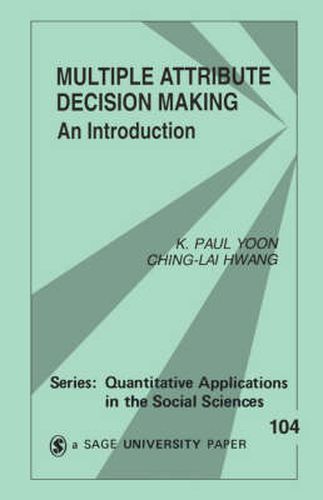Readings Newsletter
Become a Readings Member to make your shopping experience even easier.
Sign in or sign up for free!
You’re not far away from qualifying for FREE standard shipping within Australia
You’ve qualified for FREE standard shipping within Australia
The cart is loading…






Multiple attribute decision making (MADM) procedures, a process for making preference decisions over the available alternatives which are characterized by multiple (usually conflicting) attributes are useful for improving decision making in a wide range of circumstances–from professional to managerial to political. Using real-world case examples, the authors introduce the reader to normative (for optimal decisions) MADM models. Beginning in chapter 2 with and introductions to the various attributes in a decision, the authors explore how MADM methods can be used for descriptive purposes to model the existing decision-making process, noncompensatory and scoring methods, accommodation of soft data, construction of a multiple decision support system, and the validity of methods. The authors also include a presentation of the advanced procedures of TOPSIS and ELECTRE. This manual offers social scientists an encapsulated view of MADM methods, their characteristics, applicability, and the methods for solving MADM problems.
$9.00 standard shipping within Australia
FREE standard shipping within Australia for orders over $100.00
Express & International shipping calculated at checkout
Multiple attribute decision making (MADM) procedures, a process for making preference decisions over the available alternatives which are characterized by multiple (usually conflicting) attributes are useful for improving decision making in a wide range of circumstances–from professional to managerial to political. Using real-world case examples, the authors introduce the reader to normative (for optimal decisions) MADM models. Beginning in chapter 2 with and introductions to the various attributes in a decision, the authors explore how MADM methods can be used for descriptive purposes to model the existing decision-making process, noncompensatory and scoring methods, accommodation of soft data, construction of a multiple decision support system, and the validity of methods. The authors also include a presentation of the advanced procedures of TOPSIS and ELECTRE. This manual offers social scientists an encapsulated view of MADM methods, their characteristics, applicability, and the methods for solving MADM problems.